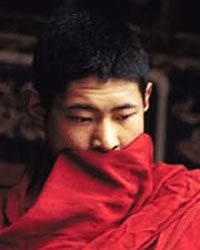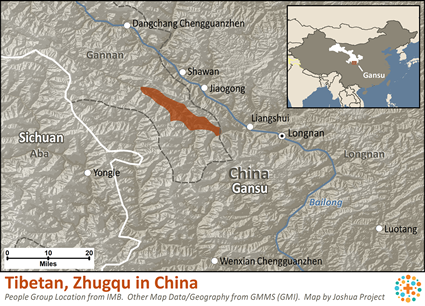The Tibetans of Zhugqu are counted as part of the Tibetan nationality, but along with several other groups in southern Gansu—such as the Baima and the Boyu Tibetans—they are a specific ethnolinguistic group with their own language and customs.
The Zhugqu Tibetans have a long history. A Chinese writer remarked, "Their forebears fled from the horrors of war (during the Southern Song Dynasty, 1127-1279) and eventually settled here and in surrounding areas, where they have multiplied over the generations."
The homes of the Zhugqu Tibetans are one story, built of mud, stone and wood. Due to the lack of level ground, "nearly every household has a flat platform which serves many purposes. … Some people, when they walk out their own door, are in fact standing on the neighbor's roof." Every year, usually in the fifth lunar month, the Zhugqu Tibetan men celebrate the Arrow-Planting Ceremony. Women are not allowed to participate. The men ride horses up to the mountaintop and plant prayer flags on the summit. "A respected elder of the tribe directs the sacrificial rites. Each in turn lays roasted flour, butter, barley and tea on to a pile of heaped-up cypress branches, which are then set alight and burned. These are offerings to the mountain god."
The Zhugqu Tibetans are polytheists. Their pre-Buddhist belief of Bon includes the belief that mountains are holy. They believe powerful demons live inside the highest mountains. "They pray to the mountain god to make their hopes and wishes come true: peace, security, thriving livestock, and abundant harvests." There are different legends explaining the origin of the Arrow-Planting Festival. One states that there was a "certain man of dignity and fame who, after he died, was found by the gods to be too bad for heaven but too good for hell. Accordingly, he stayed on the earth, creating a great deal of mischief and disturbing the peoples' peace. Eventually a Living Buddha took pity on him and settled him on the mountain, directing him to give up evil and devote himself to good."
The Zhugqu Tibetans have never been reached with the gospel. Few members of this group have any awareness of the existence of Christianity. There are no Christian communities in the region, and no record exists of any missionary activity among them at any stage throughout their long history.
Like people everywhere, the Zhugqu Tibetan people need to allow the loving Savior to direct their lives. They need his forgiveness for sin.
Pray for the Lord to intervene in their families, calling people to his side.
Pray for loving workers.
Pray for their hearts to be drawn to the Lord of lords.
Pray for a church planting movement to thrive in their communities.
Scripture Prayers for the Tibetan, Zhugqu in China.
Operation China, Asia Harvest, Copyrighted © Used with permission
| Profile Source: Joshua Project |

























